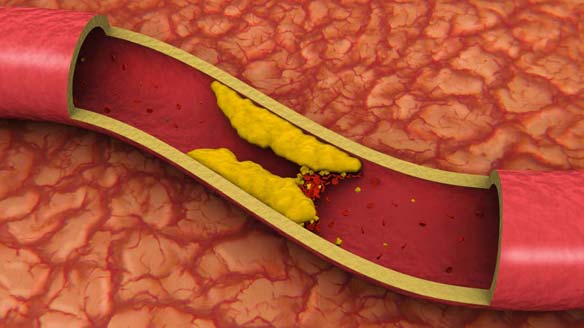High cholesterol is one of the most common precursors to cardiovascular diseases. An increasing number of the population today is now prone to have high cholesterol levels because of poor diet and inactivity. With today’s fast food, high sodium junk foods, high sugar desserts and beverages, even young people can easily pile up risk factors that lead to the inevitable rise of bad cholesterol levels in their body. High cholesterol levels can be a silent yet deadly because it can progress fast without any symptoms. The rude awakening of having the condition is often the overt complications of high cholesterol like a heart attack or stroke.
What causes High Cholesterol?
High cholesterol levels can lead to serious diseases. But what really causes it? Not all cholesterol is bad. The high density lipoprotein (HDL) is an example of good cholesterol that actually helps the body get rid of bad cholesterol in the bloodstream. Having high HDL is good but having high low density lipoprotein (LDL) is bad because these are the ones that settle in the arteries and form plaques making it harder for oxygenated blood to pass through. When arteries are clogged with bad cholesterol heart attack or stroke can be a matter of “when”, not “if”.
The Risk Factors of High Cholesterol
 It is not surprising that people who have elevated cholesterol levels are rising. Obesity can increase the risks of high cholesterol. A BMI of 30 and above can dramatically increase LDL levels. Diabetes can also cause LDL levels to go up. Since high blood sugar can damage the arteries, diabetes can make the effects of high cholesterol worse by making veins more prone to cholesterol build up. Other things that can increase one’s risk of developing high cholesterol levels are smoking, poor diet, lack of physical exertion, and last but not the least, genetics and heredity. There is no denying however that simple changes in lifestyle can make all the difference in controlling the risks of high cholesterol.
It is not surprising that people who have elevated cholesterol levels are rising. Obesity can increase the risks of high cholesterol. A BMI of 30 and above can dramatically increase LDL levels. Diabetes can also cause LDL levels to go up. Since high blood sugar can damage the arteries, diabetes can make the effects of high cholesterol worse by making veins more prone to cholesterol build up. Other things that can increase one’s risk of developing high cholesterol levels are smoking, poor diet, lack of physical exertion, and last but not the least, genetics and heredity. There is no denying however that simple changes in lifestyle can make all the difference in controlling the risks of high cholesterol.
Diagnosing High Cholesterol
The only way to know for sure if you have high cholesterol levels is to undergo blood tests. If there are heredity risks involved, regular blood tests must be done to closely monitor cholesterol levels. Why is early detection important? High cholesterol is asymptomatic. The last thing that you want to happen is suffer from a stroke out of nowhere. Give yourself a fighting chance against the condition.
Treatment for High Cholesterol
The most effective means to steer clear from high cholesterol is to adopt a healthy lifestyle. However an improved diet is sometimes not enough. Drugs like Lipitor (atorvastatin calcium) can help lower LDL levels at the same time increase HDL levels, giving the body the help it needs to take control of high cholesterol. Lipitor is a prescription drug so consulting your doctor first is necessary. Be sure to tell your doctor all the medications you are currently taking to keep you safe from harmful drug interactions. Lipitor is not safe for those who have liver disease and those who are pregnant.
Share This